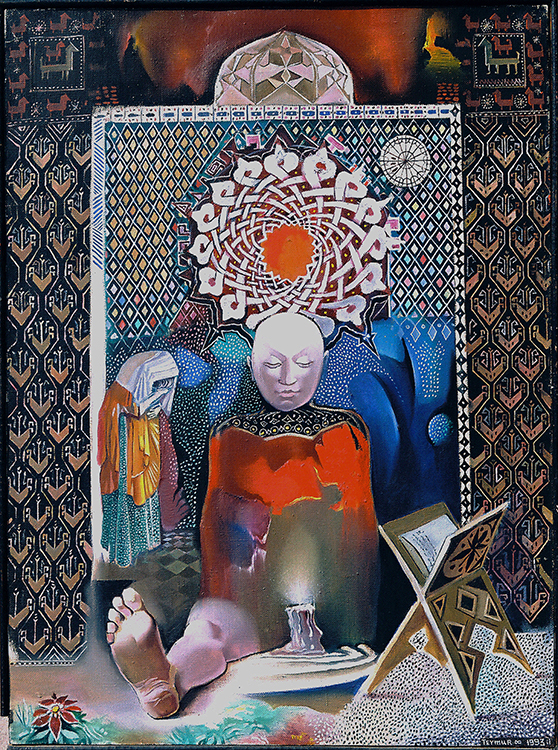Teymur Daimi is a self-proclaimed artist, teacher, and philosopher. He has participated in international exhibitions of modern art, photo and video, and similarly, scientific research conferences, seminars and debates. Teymur works in all fields of modern art and teaches at the Azeri State Art College.
- Teymur, at first you were introduced to me as an artist. I later became acquainted with your book and learned that you have a Ph.D. Then I came to learn something else very interesting… Who do you consider yourself, an artist or a scientist?
- Let's start from the last question and work our way up. I don't think that there is necessarily a conflict between these things. Actually, I think my scientific nature aids me in some ways. I like to think of the word ''artist', as a description conquering a variety of fields, as meaning doctor, artist, philosopher, and politician. During the Middle Ages, there was this wonderful idea about the ' universal artist', who had various abilities. Looking back, we are impressed with their diversity… this is what every artistic man must strive towards.

- Yes, but isn't it evident that artists and scientists move in completely opposite directions? One harbors and emits fantastic, inchoate emotions, worry, a multiplicity of feeling, while the other is more logical, concise, and mathematical. It must be very difficult to find a harmony between these two things.
- It is difficult - I definitely agree. But this is what's interesting. The brain controls man, and consists of two hemispheres, the right and the left. One side answers to logic, and the other, to intuition and emotion. More simply, within man, himself, are powers that constantly battle each other. One of our missions in life is to reach some sort of harmony within ourselves. We have to harmonize our mind and our soul. This is why it is interesting to study the arts and the sciences, which demands imagination as well as corroborated theory.
- But you must agree that art is more of a show than theory. Let's talk about your work. I see diversity in your work, but not of the kind that you speak of. Has the harmony become so latent and if so, then how?
- What I do is called 'modern art'. The modern artist must be capable of doing everything. We need ideas, conceptions, and science. Ideas come and go like a fiery impulse, like a nervous shock, a plug of electricity. At the most inappropriate times, when you least expect it, art rises within you, a mix of creation and perception, intuition and thought. It reaches up and grabs you, from the moment of the idea's birth, and doesn't relax until you have given it some sort of form.
- But this isn't really art. We have become used to the fact that, that which develops our taste gives birth to our soul.
- There are too many stereotypes and biases. The art you speak of is found in museums, hidden in St.Peterburg and Paris. It is now the property of history. We study historical epochs through them, what people wore, ate, how they rested, with whom they warred. But this type of art doesn't work any longer. It has a poor effect on man's psychology. Many modern artists have called these museums 'cemeteries'. It sounds severe, but it is said in justice.
- This doesn't seem very far from nihilism. I almost forgot, you belong to a radical anarchist genre.
- I wouldn't necessarily call myself an anarchist. I believe that art stems from careful psychological examination.
- It may be a matter of taste, but judging from your art, your psychological examination seems to be an overstatement. The emotion isn't as constricted - or directed - as you seem to suggest. Tell me how you feel about sacral art, about ancient art and its mysticism, which seems to quietly echo in your work. If this is true, then there would seem to be a definite lapse in your logic.
- The fact of the matter is that we live in a modern world, not in an ancient society. Outside your window, the electronic age is staring you smack in the middle of your forehead. The modern man differs from his ancestors. He has a psychological map, which he follows in this very cut and dried way. He is led in the direction of another culture, an audio, Internet, mobile culture. He speaks in a technical tongue, and uses this language to describe and analyze himself.
- A culture with no questions only answers - interesting. So is this mass culture in your eyes?
- Our culture is a hyper industrial society of cheap entertainment, aggressive show-business, and vulgar soap operas. There is also a nice flood of non-quality cinema.
- So what's important for you in this garbage pile of society then, as you seem to refer to it? What's most important?
- The most important for any man who ever walked this Earth, is the search for answers to the following questions: Where am I from? Where am I going? Who am I? There is nothing else. Trying to answer these questions gives us the desire and hope to fulfill our universal meaning. We can find these answers through finding inner peace, through reaching the maximal level of quiet and rest. We need to direct ourselves within, towards where we really lie.
- It seems like meditation.
- In a way it is, yes. But meditation isn't sitting with crossed legs and batting your eyelids. Some people choose to pray, some read, some meditate more traditionally, some meditate through shock - strangely enough. We have to make our own choice. What's important is to understand what makes you understand who you are, to hear yourself through your inner voice.










